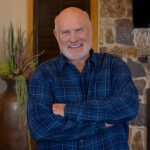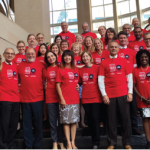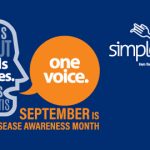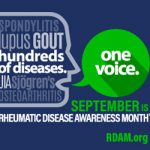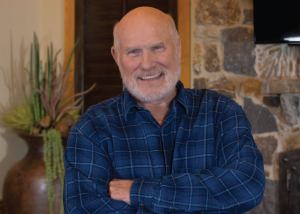
Former Pittsburgh Steelers quarterback and rheumatoid arthritis patient Terry Bradshaw will serve as the ACR’s official spokesperson for Rheumatic Disease Awareness Month in September.
Awareness can be an ambiguous term, but it makes all the difference in rheumatology. The first weeks and months following the onset of rheumatic disease symptoms are known as the window of opportunity. Prompt treatment can prevent damage to joints and other organs, improve long-term function and increase the likelihood of achieving disease remission. But the window is not open forever. Once it slams shut, a body of scientific evidence shows that health complications surface and persist for years to come.
Education, therefore, has the potential to transform the lives of millions of Americans. For this reason, the American College of Rheumatology created Rheumatic Disease Awareness Month (RDAM), an annual, national health observance month designed to increase public awareness of rheumatic diseases, their symptoms and the important role of rheumatologists in providing specialized care. Launched in September 2016, RDAM will continue this year, with several exciting initiatives planned.
“More than 54 million Americans live with painful, debilitating and life-threatening rheumatic diseases, including rheumatoid arthritis, gout and lupus,” says Sharad Lakhanpal, MBBS, MD, ACR president. “With arthritis prevalence on the rise, the cost and impact of rheumatic diseases are set to soar, so it’s vital that we get out ahead of the problem. As the leading voice for the nation’s rheumatologists and rheumatology healthcare professionals, the ACR has the platform to enact change—and we believe that such change starts with a better informed public.”
The ACR and its public awareness campaign, Simple Tasks, hope to build on the success of the first Rheumatic Disease Awareness Month hosted in 2016. The first annual RDAM featured a national public service announcement featuring actress Jennie Garth, convened more than 100 patients and providers in Washington, D.C., for an Advocates for Arthritis Capitol Hill Day and brought together dozens of valued partners—including the Centers for Disease Control and Prevention, the Mayo Clinic, Arthritis Foundation, Lupus Foundation of America, the National Institutes of Health (NIH) National Institute of Arthritis and Musculoskeletal and Skin Diseases, U.S. Rep. David McKinley and Creaky Joints—to raise awareness throughout the month of September.
Tackling Rheumatic Disease with Terry Bradshaw
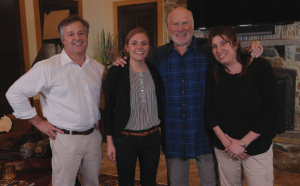
Terry Bradshaw, surrounded by members of the ACR communications team, John Schmidt (left), Erin Schmidt and Joan Roth.
This year, the ACR is tackling rheumatic disease with the help of sports commentator, former Pittsburgh Steelers quarterback and four-time Super Bowl champion Terry Bradshaw.
Mr. Bradshaw, who has rheumatoid arthritis (RA), will serve as the ACR’s official spokesperson for the campaign.
“Terry is not only a household name; he is a genuinely good person,” says Joan Roth, senior director of communications and marketing at the ACR. “As a beloved sports star who has benefited from treatment for rheumatoid arthritis, Terry was a natural choice to help us reach millions of Americans with our message about the importance of early intervention from a rheumatologist. And with RDAM celebrations happening at the same time that professional football season kicks into gear, the timing couldn’t be more perfect.”
Ms. Roth and the ACR communications team traveled to Mr. Bradshaw’s ranch in Thackerville, Okla., this past March to film a public service announcement (PSA) about rheumatic disease. The PSA will air throughout the month of September on TV stations nationwide.
According to Ms. Roth, Mr. Bradshaw will address important gaps in knowledge regarding rheumatic diseases. Although many are familiar with the relationship between injury and osteoarthritis (OA), for example, he explains that RA is a disease that can affect anyone. As Mr. Bradshaw exclaims in the PSA, “You don’t have to be an old athlete like me to have sore joints!”
Mr. Bradshaw will also feature prominently in another aspect of RDAM. The ACR will encourage users to take a rheumatic disease awareness quiz through social media for a chance to win a Pittsburgh Steelers #12 football jersey signed by Mr. Bradshaw. The social media promotion will launch with a special video message from Mr. Bradshaw on Sept. 1.
Get Involved!
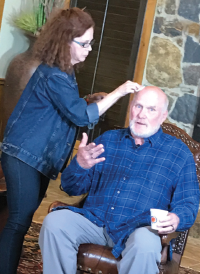
Terry Bradshaw prepares to shoot a public service announcement for Rheumatic Disease Awareness Month at his ranch in Thackerville, Okla.
Just like this past year, the ACR hopes the awareness campaign reaches a diverse audience. To make that happen, the ACR is providing members and partners with the resources necessary to get involved, such as an easy-to-use online communications toolkit that ACR members and partner organizations can use to participate in RDAM activities.
“ACR members hold a lot of sway both at the local and national levels,” says Ms. Roth. “Participants made a measurable impact last year, so we’re hoping for even more involvement this time around. We will be collecting survey feedback and enhancing the toolkit with new materials this year to make to make the process even easier for our members and partners.”
The toolkit will include customizable information for patients, communities and members of the media—including a press release, flyer, blog post and fact sheets—as well as suggested graphics and posts to share on social media. There will also be a template proclamation for advocates to share with local and state officials to recognize September as Rheumatic Disease Awareness Month. “We are excited to offer the proclamation template to our state societies as a tool and conversation starter, to garner the attention and support of our local and state leaders,” says Ms. Roth.
Finally, a group of ACR members and patient advocates will once again fly to Washington, D.C., in September to advocate for rheumatic disease care. Amid legislative uncertainty—especially when it comes to healthcare—it’s a particularly prescient time to be heard on Capitol Hill.
“As our patients continue to face high drug costs, restrictive insurer practices, and questions about the future of healthcare reform, now is the time for patients to get involved in advocacy and fight for the high-quality specialty care and services provided by rheumatologists,” emphasizes Dr. Lakhanpal.
Ultimately, rheumatic disease awareness is a cause that extends far beyond the month of September. But scaled-up efforts this September provide the rheumatology community with a unique opportunity to shape public opinion—and hopefully, improve lives along the way.
